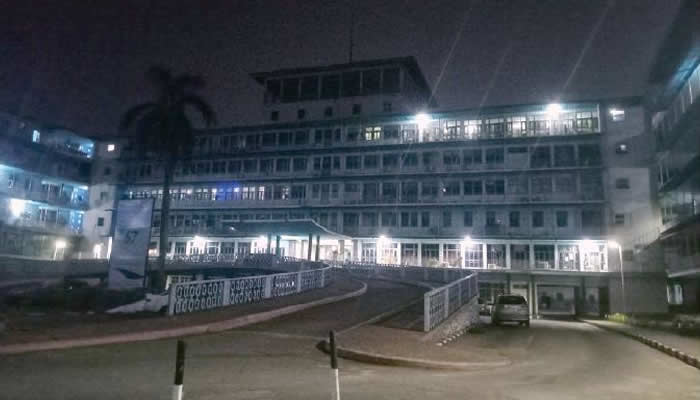For over 100 days, Nigeria’s premier teaching hospital, the University College Hospital (UCH) in Ibadan, Oyo State, operated without electricity, relying solely on backup generators, rechargeable lamps, and solar-powered devices. The power outage, which began on October 26, 2024, was due to the hospital’s disconnection from the national grid by the Ibadan Electricity Distribution Company (IBEDC) over an outstanding debt of N495 million.
The prolonged blackout led to the tragic deaths of patients, operational setbacks, and immense pressure on medical personnel, who had to rely on torchlights and manual medical equipment to save lives. The situation worsened when essential machines such as ventilators, CT scanners, and other diagnostic tools failed, forcing doctors to make heartbreaking decisions.
Power was eventually restored on February 12, 2025, following the intervention of the Minister of Power, Adebayo Adelabu. However, the devastating impact of the power crisis continues to haunt patients, medical staff, and students at the institution.
The Tragic Consequences of Power Failure at UCH
Gas Explosion Victims Struggle to Breathe as Ventilators Fail
On a cold evening in December 2024, a family of four was rushed to the Accident and Emergency (A&E) unit at UCH after a gas explosion in their home left them struggling to breathe. Upon arrival, doctors were faced with an even greater crisis—there was no electricity to power the automatic ventilators.
Medical students had to take turns operating manual ventilators, also known as Ambu bags, pressing them repeatedly for 30 minutes each to help the patients breathe. Despite their relentless efforts, two out of the four victims died by 2 a.m. the following morning.
One of the medical students who assisted in the procedure recalled the distressing experience:
“We worked in shifts, trying to keep the patients alive. But it was clear that we were fighting a losing battle. The manual ventilator just wasn’t enough. It was heartbreaking. We did everything we could, but it just wasn’t enough. I keep thinking about what could have been if only we had power.”
Elderly Patient Dies Waiting for a CT Scan
On January 23, 2025, an elderly woman, brought in for a scheduled CT scan at 8 a.m., waited for hours in a crowded hospital corridor. The hospital’s only power generator had damaged the CT scanner the day before, forcing the medical team to postpone all scans.
By 11 a.m., tragedy struck. A heart-wrenching cry echoed through the Radiology Department as the woman’s daughter tried to wake her up—only to realize she had passed away in her wheelchair.
A doctor on duty that day, identified as Tony, expressed his frustration:
“She had been waiting for hours. If there was electricity, she could have undergone the scan earlier, received treatment, and maybe survived. She died waiting for a service she never got. It’s heartbreaking.”
The CT scanner remained out of service for weeks, raising concerns about how many more patients would die waiting for medical tests.
Medical Staff Forced to Work in Darkness
With no electricity, doctors and nurses resorted to using torchlights and phone lights to administer treatments. A senior physician, Dr. Adebayo, described the difficult conditions:
“We had to use torchlights to check vital signs and administer injections. The earlier days were the worst because even the hospital management didn’t know how to handle the situation. Recently, they provided solar bulbs for the corridors of almost all the wards, but that doesn’t mean the necessary medical equipment is functional.”
A final-year medical student, Nkechi, shared a particularly grim night:
“One night in the emergency room, the power went out again. We had critical patients, and there was no power to monitor their heart rates or oxygen levels. We had to use our phone flashlights, taking turns holding the lights while others treated the patients.”
How the Power Outage Affected UCH Operations
For 109 days, UCH was disconnected from the national grid, forcing the hospital to rely on backup generators and alternative energy sources. Some of the major challenges faced during this period include:
- Medical Equipment Failures: Essential machines such as ventilators, CT scanners, dialysis machines, and incubators were rendered useless.
- Surgeries Postponed or Canceled: Many complex procedures were delayed to prevent complications due to inadequate lighting and power supply.
- Patient Rejections: Some patients requiring immediate treatment were turned away because the hospital could not guarantee their survival without power.
- Overworked Medical Staff: Doctors and nurses had to improvise, working under extreme conditions to minimize casualties.
Beyond the Patients: Medical Students Also Affected
Even after power was restored to the main hospital, medical students residing in Alexander Brown Hall and Ayodele Falase Post-Graduate Hall remained in total darkness. Students struggled with daily survival, including fetching water and finding places to charge their devices.
A 400-level medical student, Gerald Olukungi, lamented:
“Getting water has been very difficult. We have to fetch water from construction sites. It’s unsafe and unclean, but we have no choice. Some of us go to class just to charge our phones. We are not getting the education we deserve.”
Government’s Response and Planned Solutions
The Federal Government, through the Ministry of Power, has announced plans to install a solar-powered mini-grid for UCH to provide a more stable and sustainable energy source.
Minister Adebayo Adelabu stated:
“By the time we implement this solar project, the hospital’s energy bill will be less than one-third of what they are currently incurring. This is a permanent solution that will ensure this crisis never happens again.”
Additionally, the government plans to install a new transformer to differentiate power consumption between UCH and other entities on its premises, such as banks and business centers, ensuring that each institution pays for its own electricity.
Conclusion
The 109-day power outage at UCH Ibadan exposed deep-rooted infrastructural and financial challenges within Nigeria’s healthcare sector. The loss of lives, operational setbacks, and unbearable working conditions faced by medical professionals highlight the urgent need for government intervention and sustainable energy solutions for hospitals.
Although power has been restored, the scars left by this crisis remain. Many patients paid the ultimate price for an issue that could have been avoided, and medical staff continue to bear the emotional burden of those lost lives.
Moving forward, stakeholders must ensure that UCH and other medical institutions never experience such devastating blackouts again.













